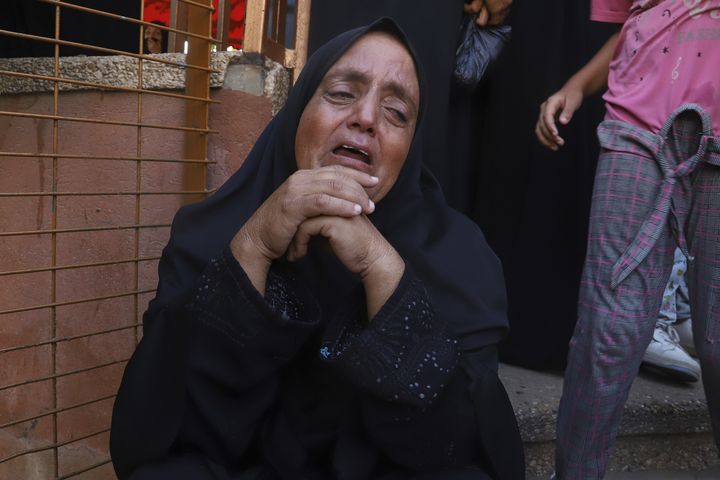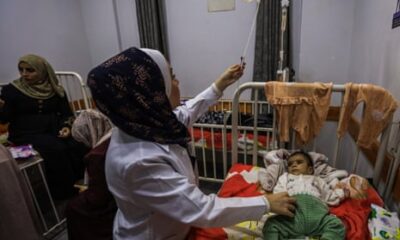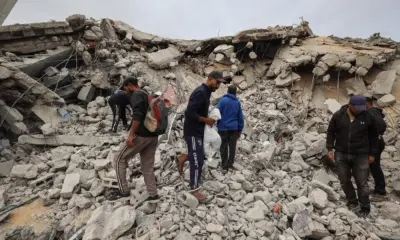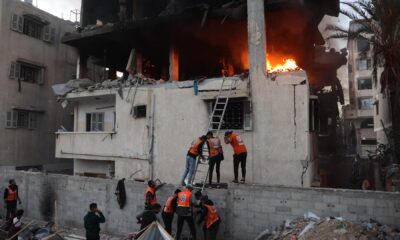Politics
Israeli Strikes Kill 25 in Gaza as Famine Crisis Deepens

Israeli airstrikes and gunfire have resulted in the deaths of at least 25 people in Gaza, including women and children, as the humanitarian crisis in the region escalates. Medics reported that the strikes primarily targeted displaced individuals seeking shelter and food, highlighting the dire situation amid a newly declared famine in Gaza City.
The Integrated Food Security Phase Classification (IPC) recently announced that Gaza City is experiencing famine conditions, a situation exacerbated by ongoing violence and restrictions on humanitarian aid. This declaration has prompted governments and aid organizations worldwide to intensify their calls for Israel to cease its offensive, which has been underway for more than 22 months following Hamas’ attacks on October 7, 2023.
Early reports indicate that Israeli strikes in southern Gaza, particularly in Khan Younis, killed at least 14 individuals as they took refuge in makeshift tents. The deaths occurred despite growing international pressure for a ceasefire. Health officials at Nasser Hospital confirmed that over half of the victims were women and children.
In addition to the fatalities in Khan Younis, at least five aid-seekers were killed in northern Gaza near the Zikim crossing, which is a primary entry point for humanitarian convoys. According to health officials at the Sheikh Radwan field hospital, the violence continued with six additional deaths reported from various attacks across Gaza on the same day. The Israeli military has not responded to inquiries regarding these casualties.
The famine declaration by IPC marks a significant acknowledgment of the crisis, noting that nearly half a million people in Gaza, or approximately a quarter of the population, face catastrophic hunger. This situation has been largely attributed to severe restrictions on food supplies and widespread displacement due to the ongoing conflict.
Despite international outcry and images of starving children, Israel has defended its actions. Prime Minister Benjamin Netanyahu‘s office labeled the IPC report as “an outright lie,” claiming that Hamas is responsible for the starvation of hostages. The Israeli government contends that sufficient aid has been allowed into Gaza during the conflict, although many aid organizations disagree, citing ongoing shortages and logistical difficulties in delivering assistance.
To address the humanitarian crisis, Israel has recently permitted some airdrops and increased land access for aid supplies. Yet, organizations like Doctors Without Borders (MSF) report that their clinics are overwhelmed with patients fleeing the violence. The group noted that the ongoing bombardments are forcing many, including their staff, to evacuate their homes repeatedly.
The situation remains critical as Israeli troops continue operations in strategic locations, with a large-scale military offensive in Gaza City anticipated in the coming days. Mediators continue to wait for Israel’s next steps regarding a potential ceasefire, as the humanitarian situation deteriorates further.
As the international community monitors developments closely, the plight of civilians in Gaza intensifies, underscoring the urgent need for effective humanitarian assistance and a resolution to the conflict.
-

 World4 days ago
World4 days agoCoronation Street’s Shocking Murder Twist Reveals Family Secrets
-

 Entertainment4 months ago
Entertainment4 months agoKate Garraway Sells £2 Million Home Amid Financial Struggles
-

 Entertainment3 months ago
Entertainment3 months agoAnn Ming Reflects on ITV’s ‘I Fought the Law’ Drama
-

 Health3 months ago
Health3 months agoKatie Price Faces New Health Concerns After Cancer Symptoms Resurface
-

 Entertainment4 weeks ago
Entertainment4 weeks agoCoronation Street Fans React as Todd Faces Heartbreaking Choice
-

 World4 weeks ago
World4 weeks agoBailey Announces Heartbreaking Split from Rebecca After Reunion
-

 Entertainment7 days ago
Entertainment7 days agoTwo Stars Evicted from I’m A Celebrity Just Days Before Finale
-

 World7 days ago
World7 days agoKevin Sinfield Exceeds Fundraising Goal Ahead of Final Marathons
-

 Entertainment3 months ago
Entertainment3 months agoCoronation Street’s Carl Webster Faces Trouble with New Affairs
-

 Entertainment3 months ago
Entertainment3 months agoWhere is Tinder Swindler Simon Leviev? Latest Updates Revealed
-

 Entertainment4 months ago
Entertainment4 months agoMarkiplier Addresses AI Controversy During Livestream Response
-

 Science2 months ago
Science2 months agoBrian Cox Addresses Claims of Alien Probe in 3I/ATLAS Discovery





















